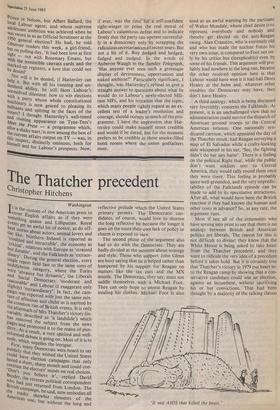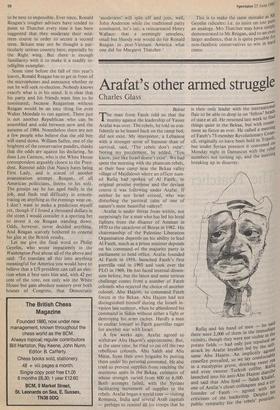The Thatcher precedent
Washington It is the custom of the American press to cover English affairs as if they were something quaint and Lilliputian. Royal events get an awful lot of notice, as do off- beat stories about actors, animal lovers and the like, Northern Ireland is reported as troubled and intractable', the economy as critical' relations with Europe as `strained but durable', and the Falklands as 'extraor- `strained but durable', and the Falklands as 'extraor-
During the general election, every single report held fast to the same sorts of Middlebrow category, where the Tories were 'abrasive but dynamic', the Liberals and Social Democrats 'moderate and reasonable' and Labour (I exaggerate only
paslihtly) m `extraordinary'. In fact, the ca - gn was reported with just the same mix- ture of affection and cliche as is merited by common run of British events. It is only the aftermath of Mrs Thatcher's victory (in- variably described as 'a landslide') which has removed the subject from the news Nes and promoted it to the realm of pun- i t! itry. As a result, a very spirited and well- nformed debate is going on. Most of it is in code, which supplies the intrigue.
First, many Democrats were heard to say Publicly that they wished the United
could have election campaigns thatStates only lasted a short, sharp month and could Con- te the electors' minds on real choices. _Don't you believe it', rep lied David 8roder, the veteran political correspondent Oder, had just returned from London. The British campaign, he said, now embodies all the trashy showbiz elements of the American one, but without the long and
reflective prelude which the United States primary permits. The Democratic can- didates, of course, would love to shorten the long reflective bit because the longer it goes on the more their own lack of policy or charm is exposed to view.
The second phase of the argument also had to do with the Democrats. They are badly divided at the moment about strategy and style. Those who support John Glenn are busy saying that he is helped rather than hampered by his support for Reagan on matters like the tax cuts and the MX missile. The Democrats, they say, must not saddle themselves with a Michael Foot. They can only hope to unseat Reagan by stealing his clothes. Michael Foot is also used as an awful warning by the partisans of Walter Mondale, whose chief desire is to represent everybody and nobody and thereby get elected on the anti-Reagan swing. Alan Cranston, who is extremely old and who has made the nuclear freeze his very own issue, is compared to Foot not on- ly by his critics but (inexplicably) even by some of his friends. This argument will pro- bably lead nowhere in the long run, because the other received opinion here is that Labour would have won it it had had Dews Healey at the helm and, whatever other troubles the Democrats may have, they don't have Healey.
A third analogy, which is being discussed very feverishly, concerns the Falklands. At present, it is an unchallenged view that no administration could survive the dispatch of American ground troops to the Central American isthmus. One nationally syn- dicated cartoon, which appeared the day of the Thatcher result, had Reagan surveying a map of El Salvador while a crafty-looking aide whispered in his ear, 'See, the fighting didn't do her any harm'. There is a feeling on the political Right that, while the public don't want soldiers sent to Central America, they would rally round them once they were there. This feeling is probably quite well-grounded, and the very unpredic- tability of the Falklands episode can be made to add to its speculative attractions. After all, what would have been the British reaction if they had known the human and other costs in advance? So, at any rate, the argument runs.
Most if not all of the columnists who have sprung into print to say that there is no analogy between British and American politics are liberals. The reason for this is not difficult to divine: they know that the White House is being asked to take heart from the Thatcher precedent, and they want to ridicule the very idea of a precedent before it takes hold. But it is certainly true that Thatcher's victory in 1979 put heart in- to the Reagan camp by showing that a con- servative candidate could win an election, against an incumbent, without sacrificing his or her convictions. That had been thought by a majority of the talking classes
'It was AIDS that killed the beast.'
to be next to impossible. Ever since, Ronald Reagan's tougher advisers have tended to point to Thatcher every time it has been suggested that they moderate their mid- term course in order to secure a second term. Britain may not be thought a par- ticularly serious country here, especially by the Right wing. But there is enough familiarity with it to make it a readily in- telligible examplar.
Some time before the fall of this year's leaves, Ronald Reagan has to get in front of the microphones and announce whether or not he will seek re-election. Nobody knows exactly what is in his mind. It is clear that his party and his friends want him to be nominated, because Reaganism without Reagan would be an easy thing for even Walter Mondale to run against. There just is not another Republican who can be assembled and sold between now and the autumn of 1984. Nonetheless there are not a few people who believe that the old boy will stand down. William Safire, one of the brightest of the conservative pundits, thinks that the odds are against his declaring. So does Lou Cannon, who is the White House correspondent arguably closest to the Presi- dent. Rumour adds that Nancy hates being First Lady, and is scared of another assassination attempt. Reagan, of all American politicians, listens to his wife. The gossips say he has aged badly in the job, and finds real difficulty in concen- trating on anything as the evenings wear on. I don't want to make a prediction myself yet, though if I found a thousand dollars in the street I would consider it a sporting bet to invest it on Reagan standing down. Odds, however, never decided anything. And Reagan scarcely bothered to conceal his glee at the British results.
Let me give the final word to Philip Geyelin, who wrote impatiently in the Washington Post about all of the above and said: 'To translate all this into anything meaningful for America you would have to believe that a US president can call an elec- tion when it best suits him and, with 42 per cent of the vote, not only win the White House but gain absolute mastery over both houses of Congress, that Democratic `moderates' will split off and join, well, John Anderson while the traditional party nominated, let's say, a reincarnated Henry Wallace: that a seemingly senseless, small but bloody war would do for Ronald Reagan in post-Vietnam America what one did for Margaret Thatcher.'
This is to make the same mistake as Mt Geyelin ridicules: i.e. to insist on too pure an analogy. Mrs Thatcher may have simp1Y demonstrated to Mr Reagan, and to an even larger audience, that it is quite possible for non-fatalistic conservatives to win in hard times.



















































 Previous page
Previous page